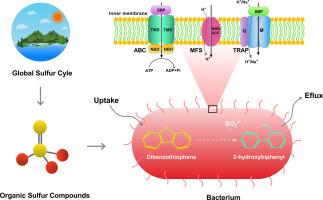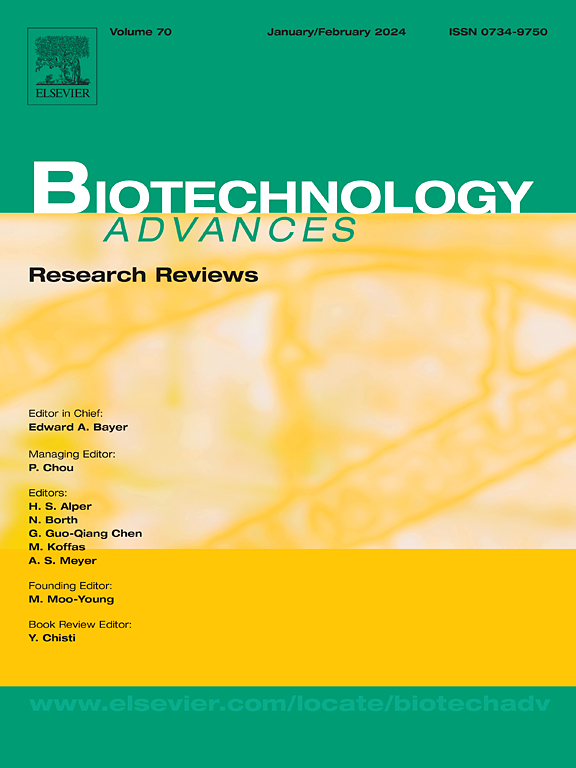Microbial transport systems of organic sulfur compounds: Diversity and implications for biocatalysis, healthcare, and environmental biotechnology
IF 12.5
1区 工程技术
Q1 BIOTECHNOLOGY & APPLIED MICROBIOLOGY
引用次数: 0
Abstract
The global sulfur cycle plays a vital role in human health, global warming, and biogeochemistry. Organic sulfur compounds constitute a substantial sulfur reservoir and serve as an energy and/or carbon source for prokaryotes. In addition, microbial interactions with organic sulfur compounds are pivotal for several biotechnological applications in petroleum biorefining, industrial biocatalysis, bioremediation, healthcare, and plant growth promotion. Microbial degradation of organic sulfur compounds is hindered by slow degradation rates, substrate specificity, toxicity of by-products, and challenges in scalability and efficiency. While degradation pathways of some organic sulfur compounds have been elucidated, transport systems involved in their uptake and efflux remain less explored. Regulating the uptake and efflux of organic sulfur compounds in microorganisms can help overcome several of the limitations associated with their transformation. Membrane transporters are not only crucial for the uptake and efflux of organic sulfur compounds but also play a key role in stress tolerance by facilitating the excretion of toxic metabolites. Understanding the intricacies of these transporters provides valuable insights into microbial ecology and the development of strategies for harnessing microbial sulfur metabolism for important biotechnological applications. This review systematically presents the diversity, mechanisms, and potential evolution pathways of microbial membrane transporters involved in organic sulfur compounds acquisition. Furthermore, it highlights and discusses advances in the characterization of transporter systems and current limitations in using transporter systems for fuel biodesulfurization and organic sulfur compound degradation. Eventually, we explore the implications of organic sulfur compounds transporters in biotechnology and identify future research directions toward leveraging the biotechnological potential of microbial sulfur metabolism, fueled by advanced techniques of systems microbiology, metabolic engineering, as well as artificial intelligence.

有机硫化合物的微生物运输系统:多样性及其对生物催化、医疗保健和环境生物技术的影响。
全球硫循环在人类健康、全球变暖和生物地球化学中起着至关重要的作用。有机硫化合物构成了大量的硫库,并作为原核生物的能量和/或碳源。此外,微生物与有机硫化合物的相互作用对于石油生物炼制、工业生物催化、生物修复、医疗保健和植物生长促进等生物技术应用至关重要。有机硫化合物的微生物降解受到降解速度慢、底物特异性、副产物毒性以及可扩展性和效率方面的挑战的阻碍。虽然一些有机硫化合物的降解途径已经阐明,但涉及其吸收和外排的运输系统仍然较少探索。调节微生物中有机硫化合物的吸收和排出可以帮助克服与它们转化相关的几个限制。膜转运蛋白不仅对有机硫化合物的吸收和外排至关重要,而且通过促进有毒代谢物的排泄,在胁迫耐受中起着关键作用。了解这些转运体的复杂性为微生物生态学和开发利用微生物硫代谢的重要生物技术应用策略提供了有价值的见解。本文系统地介绍了微生物膜转运体在有机硫化合物获取中的多样性、机制和潜在的进化途径。此外,它还强调并讨论了转运体系统表征的进展以及目前使用转运体系统进行燃料生物脱硫和有机硫化合物降解的局限性。最后,我们探讨了有机硫化合物转运体在生物技术中的意义,并确定了未来的研究方向,以利用微生物硫代谢的生物技术潜力,由系统微生物学、代谢工程和人工智能的先进技术推动。
本文章由计算机程序翻译,如有差异,请以英文原文为准。
求助全文
约1分钟内获得全文
求助全文
来源期刊

Biotechnology advances
工程技术-生物工程与应用微生物
CiteScore
25.50
自引率
2.50%
发文量
167
审稿时长
37 days
期刊介绍:
Biotechnology Advances is a comprehensive review journal that covers all aspects of the multidisciplinary field of biotechnology. The journal focuses on biotechnology principles and their applications in various industries, agriculture, medicine, environmental concerns, and regulatory issues. It publishes authoritative articles that highlight current developments and future trends in the field of biotechnology. The journal invites submissions of manuscripts that are relevant and appropriate. It targets a wide audience, including scientists, engineers, students, instructors, researchers, practitioners, managers, governments, and other stakeholders in the field. Additionally, special issues are published based on selected presentations from recent relevant conferences in collaboration with the organizations hosting those conferences.
 求助内容:
求助内容: 应助结果提醒方式:
应助结果提醒方式:


